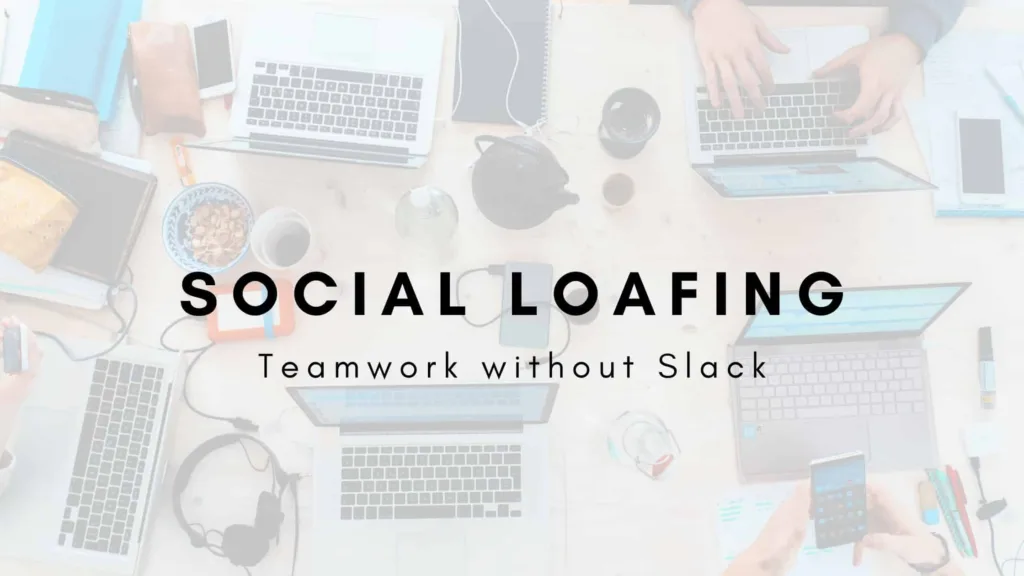Imagine you have a school project, and you’re working with a group of friends. Social loafing is when some people in the group don’t work as hard as they would if they were doing the project alone. It’s similar to the idea of believing, “Someone else will handle the tasks, so I don’t have to put in as much effort.”
People noticed this happening and gave it a name, “social loafing,” in the late 1970s. It’s interesting because you might expect that when people team up, they would do even better. But sometimes, when working in a group, individuals don’t put in their full effort.
Scientists have looked into this to understand why it happens and how we can make groups work better together. It’s like trying to figure out the best way for friends to work on a project without anyone slacking off.
Causes of Social Loafing
- Sharing Work:
- Imagine you and your friends have to tidy up a room. If you think everyone will do their share, you might not clean much, thinking others will cover for you. This is like when people in a group feel less responsible because they think others will do the work.
- Worrying About Judgment:
- Think about doing a project with your classmates. If you worry about what they’ll think, you might not help much. Social loafing is when people hold back because they’re scared of being judged or compared to others.
- Feeling Less Important:
- Picture a team playing a game like soccer. If one player thinks their job isn’t vital, they might not try their best. In social loafing, if someone feels their part in a group task isn’t very important, they might not work as hard.
So, social loafing happens when people think others will do the work, are afraid of being judged, or believe their role isn’t crucial. Knowing this helps us find ways to make sure everyone in the group does their part and tries their best.

Consequences of Social Loafing:
- Not Doing Well Together:
- When some people in a group don’t work as much, the whole group doesn’t do as well. It’s like a soccer team where not everyone plays their best, and it hurts the team’s overall performance.
- Team Spirit Going Down:
- Imagine you and your friends are doing a project, but not everyone is helping equally. The ones putting in more effort might get frustrated. This frustration can make everyone feel less happy and work together less smoothly, like a team falling apart.
- Feeling Unhappy Alone:
- If you’re in a group but not doing your fair share, you might feel bad about it. It’s like knowing you didn’t do as much as others. This feeling of not doing your best can make you unhappy about your own work in the group.
So, when social loafing happens, the group doesn’t do as well, everyone might not get along as much, and individuals might feel unhappy about their own contribution. Understanding these outcomes helps us see why it’s important for everyone to work together and do their best in a group.
Learn About: Pertinent Negatives: Uncover the full Picture
How to Cope:
- Give Everyone a Job:
- Make sure each person in the group has a specific task. It’s like when friends are playing a game, and everyone has a role. In a school project, one person can find information, another can write, and so on.
- Check How Everyone’s Doing:
- Keep an eye on what each person is contributing. It’s similar to a coach watching players in a game. Regular updates or reports on who did what can make sure everyone is doing their part. For a group project, you might have meetings to see how things are going.
- Feel Like a Team:
- Create a positive group feeling. Imagine being in a club with friends. If everyone feels proud of the group and knows that the group’s success is important, they’re more likely to work hard. Like in a music band, each person has a role, and they all aim for a great performance together.
- Talk to Each Other:
- Encourage everyone to share their thoughts. It’s like talking with friends about ideas. When people feel okay sharing their ideas and concerns, it helps the group work better. In a project, having open talks can make collaboration better and make sure everyone is on the same page.
So, to handle social loafing, give everyone clear jobs, keep an eye on contributions, create a positive group vibe, and encourage open talks. These simple steps can make group work more successful and fun for everyone.
Related Info: Passive Resistance: Strength In Silence, Power In Peace
Summing up:
Social loafing is a common and tricky thing that happens when people work together in groups. It affects both the individual and the group. If we know why it happens and what problems it causes, we can use smart ways to make things better.
By figuring out why social loafing happens and what happens when it does, and then using specific ways to stop it, groups can do better. This not only helps everyone work well together but also makes the place where they work more positive. It lets groups achieve their full potential when they work together. As we deal with the challenges of working in a team, trying to understand and solve the mysteries of social loafing is an important goal in the world of social psychology.

Pingback: Triangulation in Narcissistic Relationships
Pingback: Occidental Dissent: Spectrum of Thought and Ideas